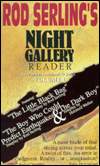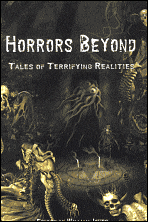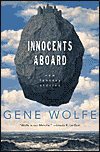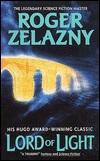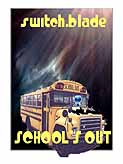
Switch.Blade School's Out, edited by Amy Sterling Casil
Book Review by Jack Crane
Have you read this book?
Everybody remembers High School. Junior High. Either you loved it or you hated it, probably both, but if you're like me, you still get an excited, exotic feeling in mid-June, that delectable feeling of -- escape. Yes, with the last school bell of the year ringing to a three month silence, the world turned from books, lockers, chalkboards, and detentions to swimming pools, camping trips, movies, and adventures -- secret adventures you could never tell your parents about.
Fictionwise has recently released its first written-to-order anthology of short SF, a daring and energetic e-anthology of Fantastic school-tales, scribed by some of the hottest, award winning authors in the field. The stories range from the gently amusing to the angrily tragic, but what they share, mostly, is an imaginative exuberance, and a feeling of escape very similar to that feeling you had waking up on the first day of summer, back when summer meant more than high utility bills and sunscreen....
The anthology kicks off with Matt Horgan's, "Connections", a not-so-original tale of virtual versus actual reality. Sarah, the young protag begins to sense a difference between herself and her classmates as she struggles with impulses to leave her virtual school, mall, and grocery store for the old fashioned and possibly dangerous real world. Horgan's prose is marred with awkward tech-slang, which seemed too close to familiar computer-ese: word doc, jack cord, digipack, etc... The story -- from its ostracized protagonist, to its taffy-sweet resolution, seemed to flirt with cliché and predictability. However, Horgan succeeds in conveying redemption through "unplugging" and touches on a soon-to-be-literal near future setting, perhaps a setting that is too close to being actual for "Connections" to really soar.
"Penny Lombard and the Heart Ken Found" was my favorite story in the collection. Alan Rodgers scribes an unforgettable tale of blossoming adolescence and the odd shadow-world we've all passed through where childhood relics begin to take on new appearances -- when we begin to see the adulthood carefully concealed behind the paraphernalia of childhood, in the back-stories of comic books, at the banks of a well-loved woodland creek -- and within our own bodies and minds. Stories of pre-adolescent love are very tricky to write and most of them fail to chart the magical and terrifying feelings of new love and sexual awakening in young people. Rodgers, in a strikingly original allegorical maneuver, manages to convey the sense of urgent absurdity that seems to overtake the world around us when we take our first steps away from Never Never Land. A beautiful story, inventive and colored with genuine compassion and wistful remembrance.
"Oh-Oh", a collaborative effort from John C. Bodin and Ron Collins is a funny and quirky story that made me smile, but reserves its real impact for younger readers. This story of an alien who "rigs" the Indianapolis 500 road race, zooms along colorfully and has quite a number of funny one-liners. Sure to be a hit with the younger audience, "Oh-Oh" is an exciting story, hopped up in a high-octane alien-as-teenager narrative voice.
"Hell-Week and Grant-Williams High", by Vera Nazarian starts out promisingly with the premise that each year during finals week, the faculty at Grant-Williams High turn into monsters -- literally, but then Nazarian simply stretches the concept too thin. This story would have been improved through a quicker and less convoluted climax and resolution and though it is an entertaining read, the author seems to have forgotten at times whether she was writing an energetic spoof, or a serious meditation on the nature of good and evil. For my money the story succeeds only at the first level and becomes rather cumbersome when it brushes on religious and philosophical themes.
"High Stakes Test" by James Van Pelt, is the only story in the antho I just didn't have any real feeling for one way or the other. It is a predictable tale, ostensibly warning against the hazards of testing over teaching, but the lackluster approach to the tale's subject matter and action seemed incongruous with the spirit of the anthology. This is the only story in the anthology that I think would bore the pants off of a younger audience.
Fortunately, Tobias Buckell gets the antho back on track in a wonderfully imaginative story, "Nord's Gambit". This was my second favorite story in the antho, full of authentic juvi-humor, colorful characters, and creative splendor. A group of near-geeks discovers that the secret of warping space and time has been cracked -- and utilized -- by the teachers in their high-school. This explains: slow moving classroom clocks, cafeteria food, the ubiquitous presence of teachers wherever you may turn, toting huge piles of graded papers... Buckell is right on target with this tale, which will tickle old fogies and thrill younger readers in equal portions. When the geeks design plan to harness the powers of a teacher's coat to launch a rocket, the story moves brilliantly from spoof to surrealism -- and back again, to a smooth landing. "Nord's Gambit" is a must-read story that effectively portrays the longing of adolescents for the trappings of adulthood, and the childlike nature of the adults who help lead them to maturity. A special story, one of the gems in this collection.
Another imaginative tour-de-force is editor, Amy Sterling Casil's, "The Universe in the Bottom of a Cereal Box". This is a deep tale and one that warrants much more commentary than can be offered here. Casil's story is idiosyncratic, breathtakingly creative, and rife with allusion to myriad childhood myths from "Alice in Wonderland", to the story's central conceit, a technological alter-world based on the "Candyland" board game. Real pathos lies beneath the surface of this story, which is the first tale in the anthology to cross convincingly into a darker and more violent realm. Casil verges on brilliance in this story and, indeed, parts of the tale are perfectly described. However, the tale seems to go on longer than necessary both in its set-up and resolution -- so with a rather cumbersome head and tail, misses masterpiece status by a few degrees. Still, there is an admirable blend of playfulness and terror in this unique story and Casil's protag is a convincing and likeable heroine. I strongly recommend this tale, but caution the reader to patience regarding the lengthy "coda" and resolution.
Michael A. Arnzen's, "Flunking the Assassin", was a story I felt little excitement about reading when I saw the title and set-up. I'm no fan of assassin stories, especially those that take place in a school for hired killers. However, Arnzen's story got off to the right foot -- setting up a tempo of hilarity and absurdity, so I came away liking the story, and prepared to dub it a success. The basic premise: an illiterate assassin who is flunking out of school, may not be the most original idea in the world, but the story is funny and moves along quickly toward a denoument that will have you laughing out loud.
"Safe as the Dark", by Lisa Silverthorne is an all-too-serious tale and the first I've encountered that attempts to use the Columbine school massacre as a theme for fiction. This piece was well-intended and sidesteps being exploitative -- but it was less than successful in my opinion and I felt the horror of the story, set in a virtual gaming afterlife, far too slight to articulate or thematically adjudicate the real life events upon which the story is based. The simple premise of poetic justice where the shooters are damned to a living reality based on video murders just seemed ineffective at dealing with the Columbine massacre, and so, for me, the story failed to provide solace or even understanding for the reader. It is a shocking and daring story and Ms. Silverthorne deserves credit for handling the issue with a certain modicum of taste. However, the massacre at Columbine refuses to be tied up so neatly and distilled into a piece of speculative fiction. Too much agony remains from the actual incident and though Silverthorne shows a great deal of anger over the incident in her tale, she fails to provide closure within the story or to convincingly portray her doomed protags. A bold offering, but one that doesn't quite succeed, all things considered.
The antho closes with the inevitable meditation on school food. "Why I Bring a Bag Lunch Now", by Tom Gerencer injects new life into this perennial complaint both stylistically and plot-wise as he scribes a smooth and funny tale of a talking pepper, school-spaceships and teacher-aliens. Conspiracy theories will never be the same after this excessive and excessively hilarious romp that confirms what anyone who's ever eaten school cafeteria food already knows -- it's safer to bring your own brown bag.
The "Switch.Blade School's Out" anthology is a fine offering from Fictionwise and proof that producing original Fictionwise collections is a very good idea. You're not liable to find another collection quite like this one, which serves up a tremendous range of mood and color, based around an intriguing theme. Most of the stories are solid escapist fiction, perfect reading for the young or young of spirit. The anthology's low moments seem to correspond with its more serious offerings -- a fitting conclusion which reinforces the spirit of escape and rebellion that the stories were meant to capture. As for the one or two less-successful stories -- they are liable to seem like a lecture or homework assignment, thereby magnifying the impact of the antho's more spirited and imaginative offerings. A highly recommended and unique collection that's worth every penny of its modest price.
Fictionwise has recently released its first written-to-order anthology of short SF, a daring and energetic e-anthology of Fantastic school-tales, scribed by some of the hottest, award winning authors in the field. The stories range from the gently amusing to the angrily tragic, but what they share, mostly, is an imaginative exuberance, and a feeling of escape very similar to that feeling you had waking up on the first day of summer, back when summer meant more than high utility bills and sunscreen....
The anthology kicks off with Matt Horgan's, "Connections", a not-so-original tale of virtual versus actual reality. Sarah, the young protag begins to sense a difference between herself and her classmates as she struggles with impulses to leave her virtual school, mall, and grocery store for the old fashioned and possibly dangerous real world. Horgan's prose is marred with awkward tech-slang, which seemed too close to familiar computer-ese: word doc, jack cord, digipack, etc... The story -- from its ostracized protagonist, to its taffy-sweet resolution, seemed to flirt with cliché and predictability. However, Horgan succeeds in conveying redemption through "unplugging" and touches on a soon-to-be-literal near future setting, perhaps a setting that is too close to being actual for "Connections" to really soar.
"Penny Lombard and the Heart Ken Found" was my favorite story in the collection. Alan Rodgers scribes an unforgettable tale of blossoming adolescence and the odd shadow-world we've all passed through where childhood relics begin to take on new appearances -- when we begin to see the adulthood carefully concealed behind the paraphernalia of childhood, in the back-stories of comic books, at the banks of a well-loved woodland creek -- and within our own bodies and minds. Stories of pre-adolescent love are very tricky to write and most of them fail to chart the magical and terrifying feelings of new love and sexual awakening in young people. Rodgers, in a strikingly original allegorical maneuver, manages to convey the sense of urgent absurdity that seems to overtake the world around us when we take our first steps away from Never Never Land. A beautiful story, inventive and colored with genuine compassion and wistful remembrance.
"Oh-Oh", a collaborative effort from John C. Bodin and Ron Collins is a funny and quirky story that made me smile, but reserves its real impact for younger readers. This story of an alien who "rigs" the Indianapolis 500 road race, zooms along colorfully and has quite a number of funny one-liners. Sure to be a hit with the younger audience, "Oh-Oh" is an exciting story, hopped up in a high-octane alien-as-teenager narrative voice.
"Hell-Week and Grant-Williams High", by Vera Nazarian starts out promisingly with the premise that each year during finals week, the faculty at Grant-Williams High turn into monsters -- literally, but then Nazarian simply stretches the concept too thin. This story would have been improved through a quicker and less convoluted climax and resolution and though it is an entertaining read, the author seems to have forgotten at times whether she was writing an energetic spoof, or a serious meditation on the nature of good and evil. For my money the story succeeds only at the first level and becomes rather cumbersome when it brushes on religious and philosophical themes.
"High Stakes Test" by James Van Pelt, is the only story in the antho I just didn't have any real feeling for one way or the other. It is a predictable tale, ostensibly warning against the hazards of testing over teaching, but the lackluster approach to the tale's subject matter and action seemed incongruous with the spirit of the anthology. This is the only story in the anthology that I think would bore the pants off of a younger audience.
Fortunately, Tobias Buckell gets the antho back on track in a wonderfully imaginative story, "Nord's Gambit". This was my second favorite story in the antho, full of authentic juvi-humor, colorful characters, and creative splendor. A group of near-geeks discovers that the secret of warping space and time has been cracked -- and utilized -- by the teachers in their high-school. This explains: slow moving classroom clocks, cafeteria food, the ubiquitous presence of teachers wherever you may turn, toting huge piles of graded papers... Buckell is right on target with this tale, which will tickle old fogies and thrill younger readers in equal portions. When the geeks design plan to harness the powers of a teacher's coat to launch a rocket, the story moves brilliantly from spoof to surrealism -- and back again, to a smooth landing. "Nord's Gambit" is a must-read story that effectively portrays the longing of adolescents for the trappings of adulthood, and the childlike nature of the adults who help lead them to maturity. A special story, one of the gems in this collection.
Another imaginative tour-de-force is editor, Amy Sterling Casil's, "The Universe in the Bottom of a Cereal Box". This is a deep tale and one that warrants much more commentary than can be offered here. Casil's story is idiosyncratic, breathtakingly creative, and rife with allusion to myriad childhood myths from "Alice in Wonderland", to the story's central conceit, a technological alter-world based on the "Candyland" board game. Real pathos lies beneath the surface of this story, which is the first tale in the anthology to cross convincingly into a darker and more violent realm. Casil verges on brilliance in this story and, indeed, parts of the tale are perfectly described. However, the tale seems to go on longer than necessary both in its set-up and resolution -- so with a rather cumbersome head and tail, misses masterpiece status by a few degrees. Still, there is an admirable blend of playfulness and terror in this unique story and Casil's protag is a convincing and likeable heroine. I strongly recommend this tale, but caution the reader to patience regarding the lengthy "coda" and resolution.
Michael A. Arnzen's, "Flunking the Assassin", was a story I felt little excitement about reading when I saw the title and set-up. I'm no fan of assassin stories, especially those that take place in a school for hired killers. However, Arnzen's story got off to the right foot -- setting up a tempo of hilarity and absurdity, so I came away liking the story, and prepared to dub it a success. The basic premise: an illiterate assassin who is flunking out of school, may not be the most original idea in the world, but the story is funny and moves along quickly toward a denoument that will have you laughing out loud.
"Safe as the Dark", by Lisa Silverthorne is an all-too-serious tale and the first I've encountered that attempts to use the Columbine school massacre as a theme for fiction. This piece was well-intended and sidesteps being exploitative -- but it was less than successful in my opinion and I felt the horror of the story, set in a virtual gaming afterlife, far too slight to articulate or thematically adjudicate the real life events upon which the story is based. The simple premise of poetic justice where the shooters are damned to a living reality based on video murders just seemed ineffective at dealing with the Columbine massacre, and so, for me, the story failed to provide solace or even understanding for the reader. It is a shocking and daring story and Ms. Silverthorne deserves credit for handling the issue with a certain modicum of taste. However, the massacre at Columbine refuses to be tied up so neatly and distilled into a piece of speculative fiction. Too much agony remains from the actual incident and though Silverthorne shows a great deal of anger over the incident in her tale, she fails to provide closure within the story or to convincingly portray her doomed protags. A bold offering, but one that doesn't quite succeed, all things considered.
The antho closes with the inevitable meditation on school food. "Why I Bring a Bag Lunch Now", by Tom Gerencer injects new life into this perennial complaint both stylistically and plot-wise as he scribes a smooth and funny tale of a talking pepper, school-spaceships and teacher-aliens. Conspiracy theories will never be the same after this excessive and excessively hilarious romp that confirms what anyone who's ever eaten school cafeteria food already knows -- it's safer to bring your own brown bag.
The "Switch.Blade School's Out" anthology is a fine offering from Fictionwise and proof that producing original Fictionwise collections is a very good idea. You're not liable to find another collection quite like this one, which serves up a tremendous range of mood and color, based around an intriguing theme. Most of the stories are solid escapist fiction, perfect reading for the young or young of spirit. The anthology's low moments seem to correspond with its more serious offerings -- a fitting conclusion which reinforces the spirit of escape and rebellion that the stories were meant to capture. As for the one or two less-successful stories -- they are liable to seem like a lecture or homework assignment, thereby magnifying the impact of the antho's more spirited and imaginative offerings. A highly recommended and unique collection that's worth every penny of its modest price.
| Switch.Blade School's Out, edited by Amy Sterling Casil on Amazon |
Switch.Blade School's Out, edited by Amy Sterling Casil on Amazon

| More Books You Might Like |
Comment on Switch.Blade School's Out, edited by Amy Sterling Casil
| Comments on Switch.Blade School's Out, edited by Amy Sterling Casil |
| There are no comments on this book. |
